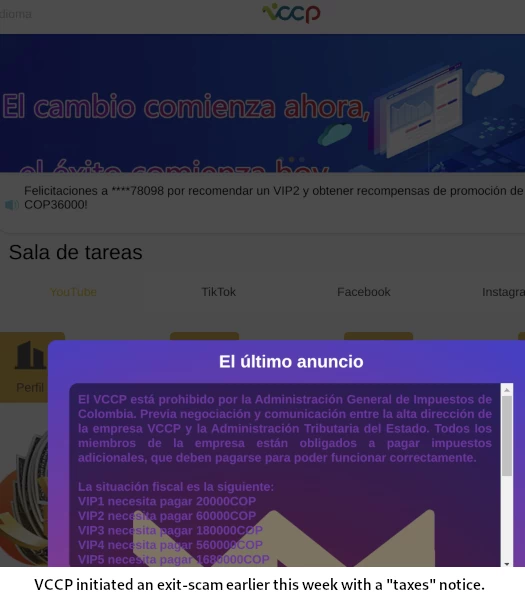VCCP “click a button” Ponzi collapses, pulls “taxes” exit-scam
 VCCP was a “click a button” Ponzi scheme targeting Colombia
VCCP was a “click a button” Ponzi scheme targeting Colombia
The scheme recently collapsed, leading to a new type of exit-scam.
VCCP was your typical “click a button scheme. Investors were led to believe manipulating social media generated ROI revenue, when in fact VCCP was just shuffling invested funds around.
Typically when the “click a button” Ponzi schemes collapse, the Chinese scammers behind them just pull the website.
If the area they were targeting was profitable, they’ll continue to launch clone app Ponzis until local investors wisen up.
In the case of VCCP though, a new exit-scam strategy has emerged.

Sometime over the past week recently visitors to VCCP were greeted with the following message:
The VCCP is prohibited by the General Tax Administration of Colombia.
Prior negotiation and communication between the senior management of the VCCP company and the State Tax Administration.
All members of the company are required to pay additional taxes, which must be paid in order to function properly.
While Ponzi schemes are illegal in Colombia, as they are everywhere, the scammers have created a story to hide their exit-scam behind.
Under the guise of collecting taxes (which makes no sense anyway), the VCCP scammers are looking to fleece Colombians out of even more money.
VCCP investors are being asked to pay between 20,000 to 15.1 million COP to release backoffice funds.
The exit-scam hinges on gullible VCCP investors believing backoffice funds actually exists to withdraw.
The original account balance cannot be used for tax purposes. Work normally after paying taxes.
Employee companies that do not pay taxes on time will be ejected and their member account will be permanently frozen.
The VCCP scammers even go so far as to threaten investors who don’t pay up with tax fraud.
During the freeze period, your employment income will be affected and your credit will be submitted to the Colombian Tax Office.
Obviously anyone in Colombia can contact local tax authorities to verify VCCP’s threats are bogus. But they’re counting on investors participating in Ponzi schemes not wanting to involve authorities.
The final bit of salt VCCP rubs into its exit-scam wound is:
The funds in VCCP will also be donated to social welfare organizations.
Make no mistake. VCCP’s exit-scam has nothing to do with Colombian authorities. Any additional COP handed over will go straight into the pocket of Chinese scammers.
Although the length of time “click a button” Ponzis last is shrinking (we’re down to a week or two for most of them), they continue to be pumped out hoping to target investors in new regions.
Thus far BehindMLM has documented twenty-nine “click a button” app Ponzis:
- COTP – pretended affiliates clicking a button generated trading activity, collapsed May 2022
- EthTRX app-based Ponzi with the daily task component disabled, collapsed July 2022
- Yu Klik – pretends clicking a button generates trading activity, targeting Indonesia
- Leefire – pretended affiliates clicking a button generated orders for ecommerce partners, targeted Philippines & collapsed May 2022
- KKBT – pretended clicking a button generates crypto mining revenue, targeted South Africa and India & collapsed early June 2022
- EasyTask 888 – pretends clicking a button was tied to social media manipulation (YouTube likes), targets Colombia, collapsed July 2022
- DF Finance – pretended clicking a button generated “purchase data” which was sold to ecommerce platforms, collapsed June 2022
- Shared989 – pretended clicking a button was tied to social media manipulation (YouTube likes etc.), collapsed June 2022
- 86FB – pretended clicking a button was tied to gambling on football match outcomes, collapsed April 2022
- 0W886 – pretended clicking a button was tied to gambling on football match outcomes, collapsed May 2022
- U91 – pretended clicking a button was tied to gambling on football match outcomes, collapsed May 2022
- 365Ball – pretends clicking a button is tied to gambling on football match outcomes, (has collapsed multiple already)
- YLCH Football – pretends clicking a button is tied to gambling on football match outcomes, collapsed July 2022
- Parkour – pretends clicking a button is tied to social media manipulation (YouTube likes etc.), collapsed July 2022
- OTCAI – pretended affiliates clicking a button generated trading activity, collapsed May 2022
- N9 Football – pretended affiliates clicking a button was tied to gambling on football match outcomes, collapsed May 2022
- Tron.BI – pretends affiliates clicking a button was tied to TRX cloud mining
- EFG Football – pretended affiliates clicking a button was tied to gambling on football match outcomes, collapsed May 2022
- GP Football – pretended affiliates clicking a button was tied to gambling on football match outcomes, collapsed May 2022
- Lucky Football, pretended affiliates clicking a button was tied to gambling on football match outcomes, collapsed May 2022
- WT91 – pretends affiliates clicking a button is tied to gambling on football match outcomes, collapsed July 2022
- Mars Football – pretends affiliates clicking a button is tied to gambling on football match outcomes, collapsed July 2022
- MC Football – pretends affiliates clicking a button is tied to gambling on football match outcomes, collapsed July 2022
- PerRank – pretended affiliates clicking a button generated orders for ecommerce partners, collapsed June 2022
- Fondo Angel – app-based Ponzi with the daily task component disabled, collapsed July 2022
- Zpmxcfe – pretends clicking a button is tied to social media manipulation (YouTube likes etc.), collapsed July 2022
- Let’s Yarn – pretends clicking a button generates orders on Etsy, collapsed July 2022
- Big Forest – pretends affiliates clicking a button generated orders for ecommerce partners, collapsed July 2022
- AOL918 – pretends clicking a button is tied to social media manipulation
As previously stated, all the app-based task Ponzis appear to be launched by the same group of Chinese scammers.

